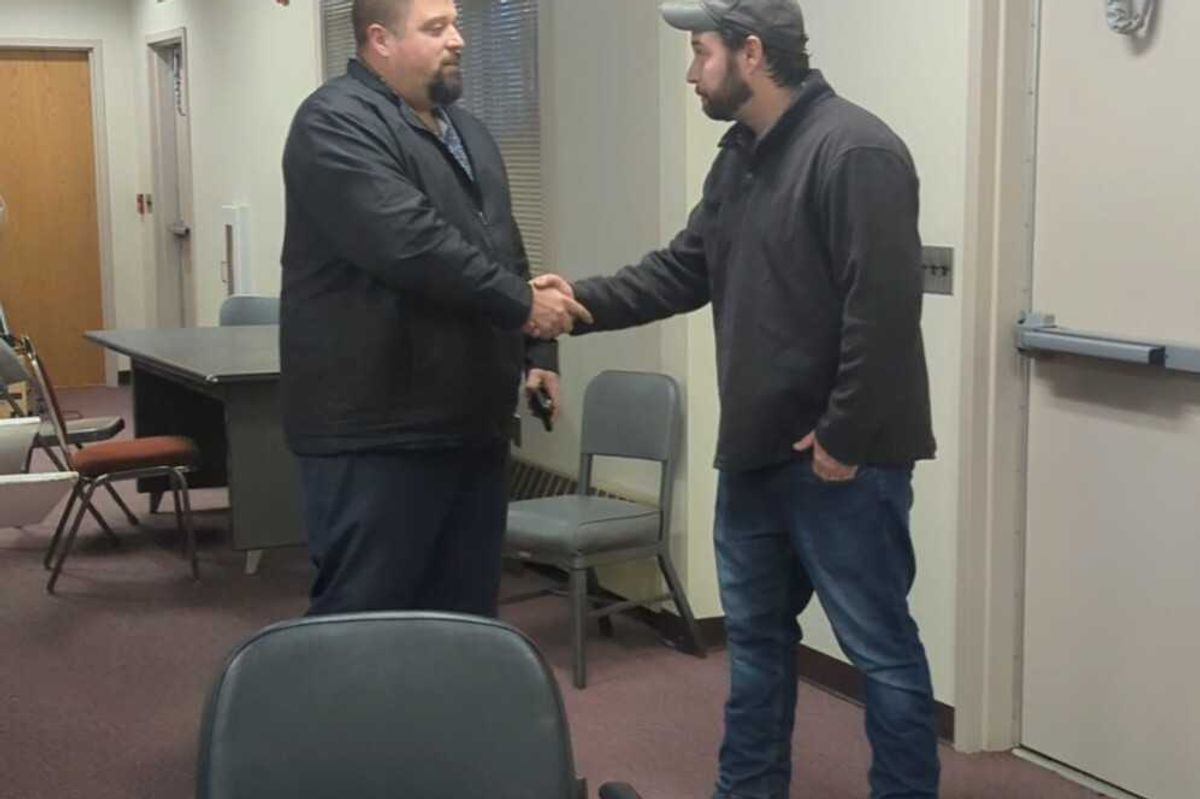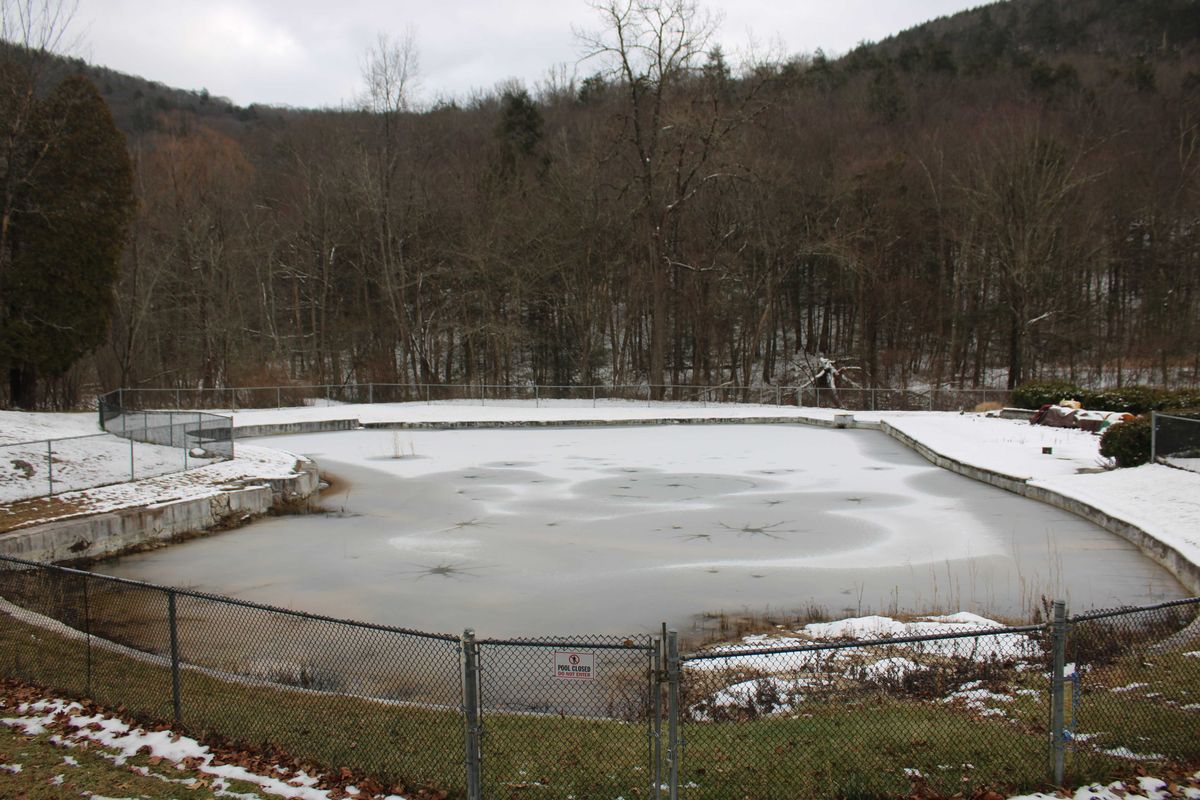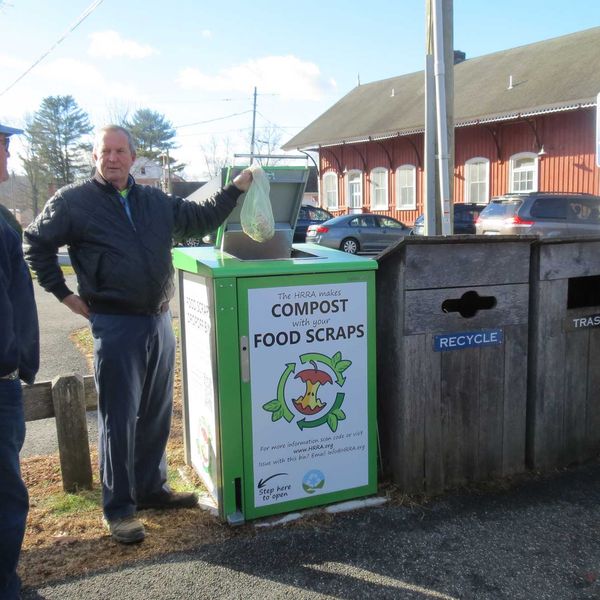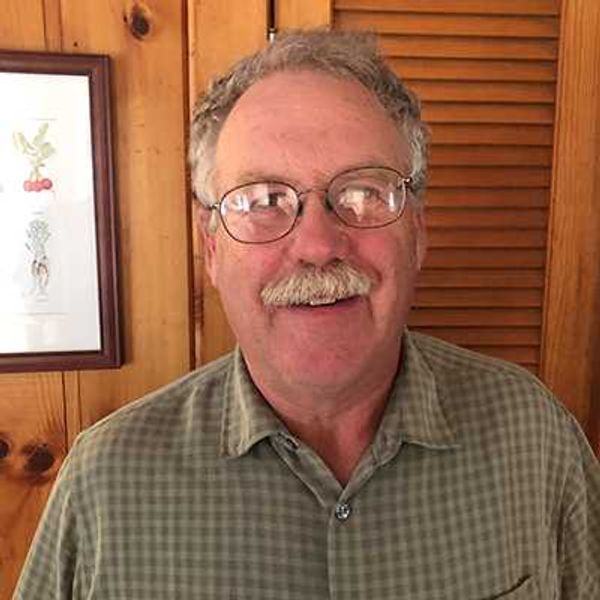Latest News
Local officials join Richard Baumann, far left, president of the Sharon Housing Trust, as they break ground in October at 99 North Main St., the former community center that will be converted into four new affordable rental units.
Ruth Epstein
SHARON — The Sharon Housing Trust announced Dec. 4 that the Connecticut Department of Housing closed on a $2 million grant for the improvement and expansion of affordable rental housing in town.
About half of the funding will reimburse costs associated with renovating the Trust’s three properties at 91, 93 and 95 North Main St., which together contain six occupied affordable units, most of them two-bedroom apartments. Planned upgrades include new roofs, siding and windows, along with a series of interior and exterior refurbishments.
The remaining funds will be spent on converting 99 North Main St. — the unused former town community center — into four new affordable rental units, with two bedrooms each. The Trust has leased the community center from the Town of Sharon for 99 years at $1 per year. Grant money for the project will become available once the Trust presents the State with completed architect’s construction drawings for the building conversion and takes other construction-ready steps.
The Trust’s budget for the entire North Main Street project is more than $2 million, and the Trust continues to seek additional funds from local foundations, private individuals and businesses. The Trust is a registered charity, and donations to the Trust are tax-deductible.
Richard Baumann, president of the Sharon Housing Trust, expressed gratitude to the Connecticut Department of Housing as well as local supporters, issuing a statement on Dec. 8.
“With their help, we plan to create a welcoming, 10-unit affordable housing campus on Sharon’s North Main Street, providing reasonable housing to those who need it and helping all Sharon residents take pride in what their community can accomplish.”
Keep ReadingShow less
Jesse Bunce, right, and outgoing First Selectman Brian Ohler, left, exchange a handshake following the Nov. 10 recount of the North Canaan first selectman race. Bunce won the election, defeating Ohler by two votes, beginning a transition marked by challenges.
Photo by Riley Klein
NORTH CANAAN — The transition from outgoing First Selectman Brian Ohler to newly elected First Selectman Jesse Bunce has been far from seamless, with a series of communication lapses, technology snags and operational delays emerging in the weeks after an unusually close election.
The Nov. 5 race for first selectman went to a recount, with Bunce winning 572 votes to Ohler’s 570. When the final results were announced, Ohler publicly wished his successor well.
“Congratulations,” he said. “Wish you all the best. When you succeed, the Town of North Canaan succeeds.”Ohler, who will remain on the Board of Selectmen, later wrote, “The future of North Canaan is bright… Now is not the time to wish failure or misstep upon any elected official.”
Despite those well-wishes, the handoff has been anything but smooth.
Facebook fiasco
The highest-profile hiccup has involved the Town of North Canaan’s Facebook page. Bunce said he never received administrative access to it, despite what should have been a quick and routine handoff.
In an email obtained through a Freedom of Information request, Bunce’s staff member Christian Allyn offered to help Ohler complete the transfer in person at Town Hall. “Jesse said you were having trouble handing over the Facebook page,” Allyn wrote to Ohler on Nov. 24. “If we can set a time, I can help you do this at the Selectman’s Office. It should take under 10 minutes.”
The transfer never took place– and earlier this month, the page disappeared entirely.
Bunce said he and his staff are now creating a new town Facebook page under the same name so residents can resume receiving updates, though followers of the original page will need to re-follow the new one.
Ohler said he tried to transfer the page but ran into verification hurdles tied to his personal account. He said he contacted Facebook for help and ultimately concluded that deleting the page was the only solution.
Town attorney D. Randall DiBella, a partner at Cramer & Anderson, called the situation extraordinary.
“This is the first time I have had this issue in 44 years,” he said, noting that his firm represents nine Connecticut towns. DiBella said Ohler lawfully managed the page while serving as first selectman, but was not permitted to continue doing so once he lost the election.
He was unaware the page had been deleted, but said its removal was a positive development. DiBella said it is still unclear whether the Facebook page constituted town property.
Ohler, however, maintained that he was not trying to obstruct the transition. “Between Jesse and I, there has been no animosity,” Ohler said. “People have their opinions, but we were willing to offer information without issue.”
Teacher pay delayed as treasurer transition hits snags
Another early test of the transition emerged when teachers and staff at North Canaan Elementary School were paid several days late. The delay stemmed from handoff problems between outgoing treasurer Emily Minacci and incoming Treasurer Melanie Neely, a Democrat who defeated Minacci in November.
School employees were supposed to receive their pay on Wednesday, Nov. 26 — the day before Thanksgiving — but the deposits never hit their accounts. Neely and Bunce learned of the missed payroll on Friday, Nov. 28, and immediately went to the bank to resolve the problem.
According to Bunce, the bank had indicated earlier in the week that the school’s payroll ran automatically– via ACH payments–like all other town departments. Instead, they learned that the school payroll required manual approval, which Neely was unable to process since she did not have online bank access. Getting access is not straight forward, officials said, unless it is transferred from one treasurer to another.
“It’s a multimillion-dollar account,” Bunce said. “There are lots of verifications. They [the banks] don’t just turn over access like that.”
Neely, who now has online access, said steps have been put in place to prevent similar issues. “We are setting up procedures to make sure an outgoing treasurer provides online access to a new treasurer, which will make transitions quicker and smoother,” she said.
Principal Beth Johnson assisted school employees once she learned of the delay. She called employees on Friday, Nov. 28, and offered to issue checks to anyone who needed immediate funds; one employee accepted. Johnson said the matter “has been resolved.”
Administrative turnover adds complications
The Town’s administrative assistant resigned around the time of the recount, adding another layer of disruption during the transition. The assistant’s departure made it difficult for Bunce to access several of the town’s communication tools.
Although he eventually received the correct usernames and passwords for Constant Contact, the system continued sending verification codes to phone numbers belonging to former staff, temporarily locking him out. Similar login problems also pertained to the town’s Zoom and YouTube accounts, which are used to livestream and archive public meetings.
Bunce, however, said he now has access to them.
Board of Selectmen’s monthly meeting postponed
Bunce pushed back his first Board of Selectmen meeting as First Selectman from Dec. 1 to Dec. 15. He said that he postponed the meeting because several key officials — the treasurer, tax collector, town clerk and his administrative assistant — were new to their roles. He said he wanted to get to know them–and learn more about their departments–before the meeting.
“I’d like to have a few weeks together before we go to the public,” he said, noting that with all the change, it was too soon.
Both men call for cooperation despite tensions
In interviews, both Bunce and Ohler insist the transition remains cordial, even as the bumps draw public attention.
Bunce said Ohler has come to his office, reviewed upcoming matters, and “has been accessible” when questions arise. “It’s no easy thing to lose an election,” Bunce said. “I think he’s handled it with grace.”
Ohler, for his part, said he has refrained from engaging in online back-and-forth, even as he bristled at political commentary from some residents. “I’m not one to malign anyone,” he said. “When my name is dragged through the mud, I don’t take the bait.”
Both men said they hope the town will move past election-season tensions.
“My future goal,” Bunce said, “is to have the collaboration of all three selectmen working together for the betterment of the town.”
Riley Klein and Ruth Epstein contributed to this article
Keep ReadingShow less
Officials, firefighters and community members break ground on the Norfolk Volunteer Fire Department’s new firehouse on Dec. 6.
By Jennifer Almquist
NORFOLK — Residents gathered under bright Saturday sunshine on Dec. 6 to celebrate a milestone more than a decade in the making: the groundbreaking for the Norfolk Volunteer Fire Department’s new firehouse.
U.S. Congresswoman Jahana Hayes (D-5) and State Rep. Maria Horn (D-64) joined NVFD leadership, town officials, members of the building committee and Norfolk Hub, and 46 volunteer firefighters for the groundbreaking ceremony.
With shovels in hand, participants dug into the soil beside the current Shepard Road firehouse, which will be demolished once the new facility is complete. The project is slated for completion on Dec. 21, 2026.
The town unanimously approved the new building at a special meeting on May 22, 2025, voting to replace the aging 50-year-old station considered no longer adequate for modern apparatus or safety standards. The NVFD has served Norfolk as an all-volunteer department for more than 120 years.

Henry Tirrell, Norfolk’s newly-elected First Selectman, welcomed the crowd of more than 150 people. He thanked his predecessor, Matt Riiska, a key player who worked for the past five years to secure funding for the building projected to cost $10.4 million.
Assistant Chief Matt Ludwig said, “One thing this experience has taught me is that building a firehouse isn’t just about blueprints and budgets. It’s about people, patience and a whole lot of teamwork.”
Fire Chief Brian Hutchins said, “This reflects the trust this town places in its volunteers, and the commitment we make in return; to be ready, dependable, and there when someone needs us. To the members of the Norfolk Volunteer Fire Department: this moment belongs to you as well. Your dedication, your patience, and your steady commitment to serving this town are the reason this station is being built; and it’s well earned.”
Tony Kiser and Barry Roseman lead the capital campaign, which to date has raised $3 million. Tirrell acknowledged the work of the architects Silver, Petrucelli + Associates of Hamden and Newfield Construction Group of West Hartford, which is managing the project.
State Rep. Horn helped secure a $2.5 million state grant for the new firehouse. A longtime champion of the plan, she was warmly received by the crowd. She said, “This is really exciting to have this finally coming to fruition and start the official part of the process on a sunny day in the Icebox.”
Congresswoman Hayes secured a $500,000 federal grant for the firehouse. She stood looking across at the gleaming firetrucks and added, “This is a really great day. I am glad to be a part of it and look forward to cutting the ribbon with you next year."
Tirrell smiled as the shovels were gathered up, “I am so proud to be part of such an amazing town. One of the cornerstones of our community is the shared support for each other.”
As people said their goodbyes and stomped the mud from their boots, Tirrell added, “I am thrilled that we are starting this final step to get the NVFD a facility that is safe and meets their needs, plus the needs of this town, so they can continue to keep us and our homes safe.”
Keep ReadingShow less
It may look dormant now, but the Emery Park pond is expected to return to life in 2026
By Alec Linden
KENT — Despite sub-zero wind chills, Kent’s Parks and Recreation Commission is focused on summer.
At its Tuesday, Dec. 2, meeting, the Commission voted in favor of a bid to rehabilitate Emery Park’s swimming pond, bringing the town one step closer to regaining its municipal swimming facility. The Commission reviewed two RFP bids for the reconstruction of the defunct swimming pond, a stream-fed, man-made basin that has been out of use for six years. The plans call to stabilize and level the concrete deck and re-line the interior of the pool alongside other structural upgrades, as well as add aesthetic touches such as boulders along the pond’s edge.
Ultimately, the Commission voted unanimously to recommend a bid totaling $562,635 from locally-based landscape design firm Kent Greenhouse & Gardens. The Commission has already allocated $500,000 towards the project in funds from the municipal capital plan and the American Rescue Plan Act, known as ARPA.
To cover the remaining cost, the Commission has moved to transfer $100,000 previously allocated for Emery Park playground improvements to the pond project, though the Board of Selectmen must hold a town meeting to authorize the reallocation. The addition of those funds would total $600,000, leaving a $37,365 surplus to the total estimate, which includes an optional aerator to help maintain water quality.
“I’m confident on that number, that we can fund that amount, and if not, I’m happy to go stand on the side of the street with a cardboard sign,” said Parks and Recreation Director Matthew Busse jokingly, noting that if additional fundraising is needed, strong support is likely given residents’ interest in the project.
The Kent Greenhouse and Gardens bid edged out a competing estimate from Millennium Builders, which came in under $500,000 but proposed a less durable polyvinyl chloride (PVC) liner instead of the pricier Gunite construction offered by Kent Greenhouse and Gardens. Millennium also projected a completion date of late next year, while Kent Greenhouse and Gardens estimated that it would have the swimming area open by early summer 2026. Busse clarified that the date is speculative, though, and delays are always possible.
Busse thanked all involved and noted the project’s progress: “I’m happy to say that we have reached a point where now we’re making a decision on how we’re going to finally walk over towards the final steps of this goal. So this is a huge moment.”
Accessibility at Emery Park
Later during Tuesday’s meeting, the Parks and Recreation Commission authorized Busse to apply for $2.4 million from the state Department of Energy and Environmental Protection’s Recreational Trails grant program to expand accessibility infrastructure at Emery Park. Currently, the majority of Emery Park’s facilities, such as the playground, fields and the soon-to-be reopened swimming pond are not ADA accessible due to the park’s steep topography and uneven walkways.
Commission member Heidi Wilson outlined the plan for a handicap accessible trail that would allow for park goers with disabilities to visit those attractions. Busse added that the plans ultimately seek to connect to the camping locations further from the road and ultimately all the way to the summit of Leonard Mountain. The funding would also provide an opportunity to install accessible bathrooms.
Keep ReadingShow less
loading








